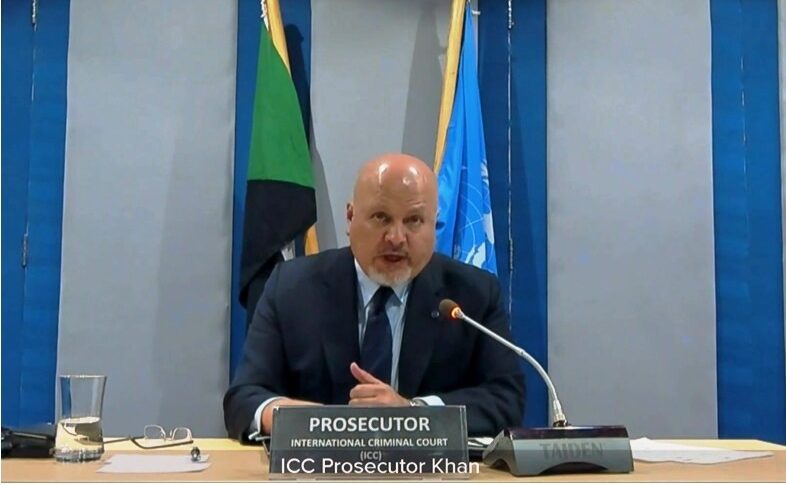Sudan’s cooperation with ICC has taken backward step: Khan tells Security Council
August 23, 2022 (UNITED NATIONS) – The prosecutor of the International Criminal Court (ICC) told the U.N. Security Council on Tuesday that Sudan’s cooperation with the war crimes tribunal has taken a backward step in recent months.
Karim Khan briefed the Security Council via videoconference from Khartoum about his fresh visits to three camps in the Darfur region including the Kalma, Hasahisa and Hamidiya displacement camps.
Khan told the 15-member body that the displaced people rejoiced and chanted “Welcome ICC!” calling for and expressing belief in justice. Also, he suggested that the Council hold a session on Sudan to hear from those in camps.
“If the international community does not deal with historic abuses, a cycle of impunity may well continue and other cycles of violence may take place,” he stressed.
Before his briefing to the Council, Khan met with the Deputy Chairman of the Sovereign Council to discuss justice and accountability in Darfur and called for more cooperation with the court in this respect.
After describing the ongoing trial of Ali Kushyab as a “glimmer of hope” for justice in Darfur, the ICC prosecutor underscored that there are four other cases in which they hope that the Sudanese government will cooperate with them to achieve accountability.
” (…) By every other metric, in terms of cooperation, the recent months have marked a backwards step, which doesn’t prejudice me. It prejudices the Council’s demand for proper investigation, and Sudan’s responsibility by UN resolution 1593 to cooperate.
The prosecutor said he would reiterate his demands for cooperation during a meeting with Abdel-Fattah al-Burhan Chairman of the Sovereign Council, on Wednesday.
Prior to the military coup of October 25, 2021, the civilian Sudanese positively cooperated with the war crimes court and signed two cooperation agreements with the ICC prosecutors. The first was on the investigation of Kushyab case and the second on all the other four cases.
In addition, the government has agreed to open an ICC office in Sudan to investigate these cases and meet the many witnesses and victims of the counterinsurgency campaigns by the government militias on civilians in Darfur.
Former Prosecutor Fatou Bensouda had urged to hand over former Deputy Interior Minister Ahmed Harun who is indicted for the same crimes as Kushyab but the military component since the joint civilian-military government refused to surrender him.
Harun is in jail together with ousted President Omer al Bashir, former Interior Minister Abdel-Raheem Hussein, while Abdallah Banda is still at large. Reports say he is in Libya fighting alongside forces loyal to Gen Khalifa Haftar.
Principle of complementarity
In a comment over Khan’s briefing to the Council, Sudanese Ambassador to the UN, al-Harith Idriss, said his government consistently demonstrated its commitment to cooperation with the Court, especially the Office of the Prosecutor.
Idris further pointed out an agreement with former Prosecutor Bensouda on three options in dealing with suspects: that the wanted former officials be prosecuted by Sudanese courts; appear before The Hague based-court, or Sudan would prosecute them by a hybrid court with international support.
The Sudanese diplomat added that the principle of legal complementarity, allows for bilateral cooperation, adding they expect that cooperation to be reciprocated to provide redress to victims.
Al-Burhan had once pledged to hand over the former president to the ICC. However, he mentioned several times the principle of legal complementarity, which states that a case is not admissible before the ICC if it is under investigation by a state that has jurisdiction over it.
In line with the ICC statute, the court could exercise its jurisdiction if Sudan fails to achieve justice because they are unwilling or its legal system is unable to do so.
“Fighting impunity is not a contentious issue,” stressed the Sudanese ambassador, “It is one of the main priorities of the Government,” reassured the Sudanese diplomat.
(ST)

